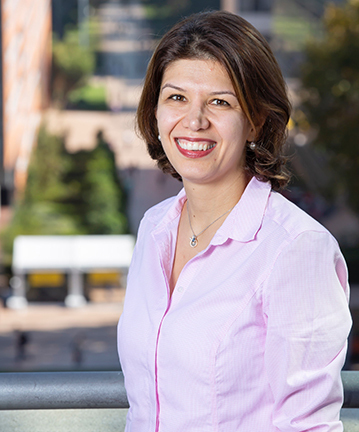
Shaghik Atakaramians
In this installment of Senior Member Insights, OPN talks with Shaghik Atakaramians. Shaghik is a Scientia Fellow at the School of Electrical Engineering and Telecommunications, University of New South Wales (UNSW) Sydney, Australia. In addition to establishing a terahertz (THz) group and leading interdisciplinary research in the field of THz meta-waveguides and devices, she is currently the engineering faculty equity-and-diversity champion and the workshop chair for CLEO Pacific Rim 2020. Her current interests include THz radiation and its application, THz waveguides/fibers and metawaveguides, THz planar devices (hybrid and reflection free) for wireless communications, electromagnetics and metamaterials, metasurfaces and metadevices.
What first interested you in pursuing science?
I grew up in a family where my inspiring figures, my father and grandfather, were mechanical and structural engineers. I always dreamed of having a career like them. I was also fascinated to learn more about satellites, antenna and communication systems. Therefore, I decided to pursue my undergraduate studies in electrical engineering by majoring in the telecommunications field.
What aspect of your current work do you find the most interesting or exciting?
I am currently establishing a THz group in UNSW, which is quite challenging, yet exciting. Such an undertaking requires technical expertise, but more so demands fine leadership and interpersonal skills. I am developing my negotiation skills to help me look for and secure grants and funds. There is always something new to learn or reflect on.
Describe a major turning point in your career. Was there a specific action/accomplishment that got you there?;
Joining UNSW Sydney and becoming a UNSW Scientia Fellow has been a major turning point in my career and has enabled me to start my own research group. The positive and forward-looking research environment, as well as the abundance of support within the School of Electrical Engineering and Telecommunications and the faculty of engineering, have been remarkable and empowering, allowing me to get a few steps closer to my ultimate career goal.
What professional resources do you rely on to stay active and engaged with your field?
I try to attend at least one international and one national conference each year. I also invite and host international researchers for a week or two. This provides opportunities for my group to interact with renowned researchers in the field. I recommend researchers who, like me, cannot travel often due to having a young family to take this approach.
What tips for successful networking do you have for early-career professionals?
I'd encourage the early-career professionals to attend networking events organised by professional societies and to volunteer in local society chapters and organising committees.
What is one piece of advice that you wish you were given as a student/early in your career?
"To ask for what you want." I learned to be brave to ask for what I want—with sound reasoning and justification of course.
What have you learned by being a mentor to others, and what have you learned from mentors who helped shepherd your career?
As a mentor, I have learned that mentees appreciate when the mentor listens to them carefully and shares his/her experience openly. As a mentee, I learned to be strong and resilient.
What are daily habits that help you to be successful?
My habits include talking to colleagues and seeking alternative views on not-so-straight forward problems, delegating the right task to the right person, and having a short break, such as going for a walk, when overwhelmed with challenging issues.
How important are leadership roles in career development and how do you hone your leadership skills?
Leadership roles empower one to grow in personal attributes and are vital for career development. I try to expand my leadership skills by taking leadership responsibilities, observing the leaders in my circle and taking part in personal development courses.
At this point in your career, what are you most looking forward to next?
I look forward to leading a relatively large team of researchers in solving real world problems with cutting-edge research.
If you weren't in the sciences, what would be your dream career?
If I were not an engineer, I would have loved to be an orchestra conductor or a dance choreographer.
